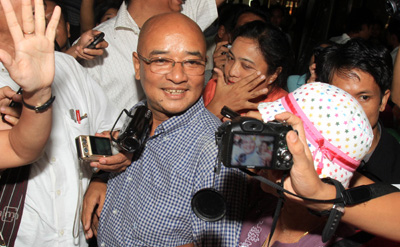Bangkok, October 12, 2011 – The Committee to Protect Journalists welcomes today’s release of Burmese blogger and comedian Maung Thura, but reiterates its call for the immediate and unconditional release of at least 13 other journalists on CPJ’s imprisoned list.
Maung Thura, popularly known as Zarganar, was released in the first phase of a promised amnesty of over 6,300 prisoners in Burma. According to international news reports, as many as 300 political prisoners were released today from detention facilities across the country.
Maung Thura was originally sentenced to 59 years in prison in November 2008 for violations of the Electronics Act, communicating with exiled dissidents, and causing public alarm in interviews with foreign media, including the BBC.
He also maintained a blog, Zarganar-windoor, which often detailed his volunteer group’s humanitarian works, including entries that were critical of the military government’s response to the 2008 Cyclone Nargis disaster.
Maung Thura’s sentence was later reduced to 35 years on appeal. Burma’s draconian Electronics Act allows for harsh prison sentences for using electronic media, including the Internet, to send information outside the country without government approval.
“While we welcome today’s release of blogger Maung Thura, it is only a token gesture as long as 13 other journalists are still behind bars,” said Shawn Crispin, CPJ’s senior Southeast Asia representative. “We urge President Thein Sein to follow through on his reform rhetoric with more concrete actions, including the release of all the journalists his government currently holds in detention.”
International rights groups estimated before today’s release that there were over 2,100 political detainees in Burma. CPJ research shows that even after Maung Thura’s release Burma is still the fourth worst jailer of journalists in the world. Burma’s government has consistently denied that it holds any political prisoners.
The mass amnesty comes in context of a political transition from decades of iron-fisted military rule to an elected, nominally civilian-led administration. President Thein Sein has promised in speeches to take a more liberal approach toward the media, which is still among the world’s most censored, according to CPJ research.
News reports last month indicated that users at Internet cafes could access various international and exile-run media news sites government authorities had previously blocked. There was no official announcement to indicate whether the apparent easing represented a shift in policy. Internet users in Burma still face potential prison sentences for accessing forbidden news sites.
Also, the director of Myanmar’s state censorship board, Tint Swe, was cited Friday as saying his own department should be abolished to allow greater press freedom, but he didn’t say when a new media law would be put in place.
Last month, CPJ released a special report on Burma’s post-election media situation that called on Thein Sein’s government to release all journalists held in detention and to stop censoring the local media.
